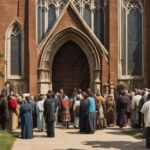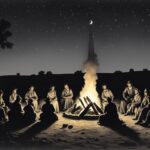The Jehovah’s Witnesses have a rich history that spans over a century. From their origins in the Bible Student movement to their present-day impact, this religious group has undergone significant milestones and transformations. In this article, we will delve into the origins of the Jehovah’s Witnesses, examine their key beliefs and doctrines, explore their historical significance, discuss denominational splits and schisms, analyze their leadership and governance structure, uncover their worship practices, assess their contemporary influence, and provide insights into their current world membership numbers and percentage among world religions.
Key Takeaways:
- The Jehovah’s Witnesses have their roots in the Bible Student movement led by Charles Taze Russell in the 1870s.
- Their key beliefs and doctrines include a rejection of the Trinity, a unique eschatology, and a paradise Earth after resurrection.
- Jehovah’s Witnesses have faced persecution, legal challenges, and have a significant impact in history.
- Denominational splits and schisms have led to the formation of splinter groups with different interpretations and practices.
- The Jehovah’s Witnesses operate under a hierarchical leadership structure with the Governing Body at the top.
Key Beliefs and Doctrines of Jehovah’s Witnesses
Jehovah’s Witnesses, as a religious group, hold several distinctive beliefs and doctrines that set them apart from mainstream Christianity. These beliefs shape their understanding of God, Jesus Christ, the afterlife, and the end times. Here are some of the key beliefs held by Jehovah’s Witnesses:
- Rejecting the Trinity: Jehovah’s Witnesses do not believe in the doctrine of the Trinity and instead believe that God is a single being, Jehovah, who is separate from Jesus Christ and the Holy Spirit.
- Jesus as a Created Being: According to their teachings, Jehovah’s Witnesses believe that Jesus Christ is a created being and not co-eternal with God. They view Jesus as the first and greatest of God’s creations, through whom all other things were made.
- Denial of an Immortal Soul: Unlike many Christian denominations, Jehovah’s Witnesses reject the concept of an immortal soul. They believe that the soul is mortal and ceases to exist after death, with the hope of resurrection in paradise on Earth.
- Paradise Earth: Jehovah’s Witnesses believe in the restoration of paradise on Earth, where the righteous will live after the resurrection. They anticipate a future where God’s kingdom will be established on Earth, and only a select number of Jehovah’s Witnesses deemed “anointed” will reign with Christ in heaven.
- Imminent Armageddon: Jehovah’s Witnesses believe in the imminent arrival of Armageddon, a cataclysmic event in which God will intervene in human affairs and destroy all forms of human government. They interpret this event as a necessary step toward the establishment of God’s kingdom on Earth.
These beliefs form the foundation of Jehovah’s Witnesses’ teachings and guide their approach to worship, evangelism, and daily living. They view themselves as the only true representatives of God’s kingdom on Earth and are known for their zeal and dedication to spreading their beliefs.
| Belief | Description |
|---|---|
| Rejecting the Trinity | Jehovah’s Witnesses do not believe in the doctrine of the Trinity and instead believe that God is a single being, Jehovah, who is separate from Jesus Christ and the Holy Spirit. |
| Jesus as a Created Being | According to their teachings, Jehovah’s Witnesses believe that Jesus Christ is a created being and not co-eternal with God. They view Jesus as the first and greatest of God’s creations, through whom all other things were made. |
| Denial of an Immortal Soul | Unlike many Christian denominations, Jehovah’s Witnesses reject the concept of an immortal soul. They believe that the soul is mortal and ceases to exist after death, with the hope of resurrection in paradise on Earth. |
| Paradise Earth | Jehovah’s Witnesses believe in the restoration of paradise on Earth, where the righteous will live after the resurrection. They anticipate a future where God’s kingdom will be established on Earth, and only a select number of Jehovah’s Witnesses deemed “anointed” will reign with Christ in heaven. |
| Imminent Armageddon | Jehovah’s Witnesses believe in the imminent arrival of Armageddon, a cataclysmic event in which God will intervene in human affairs and destroy all forms of human government. They interpret this event as a necessary step toward the establishment of God’s kingdom on Earth. |
These beliefs form the foundation of Jehovah’s Witnesses’ teachings and guide their approach to worship, evangelism, and daily living. They view themselves as the only true representatives of God’s kingdom on Earth and are known for their zeal and dedication to spreading their beliefs.
Historical Significance of Jehovah’s Witnesses
Jehovah’s Witnesses have played a significant role in history, leaving a lasting impact on religious and social landscapes. Since their inception in the late 19th century, they have faced persecution and legal battles, standing up for their beliefs and challenging societal norms. Their commitment to principles such as nonviolence, political neutrality, and evangelism has sparked controversies and prompted discussions about religious freedom and individual rights.
One of the most notable aspects of the historical significance of Jehovah’s Witnesses is their steadfast commitment to their beliefs, even in the face of adversity. During World War II, they became known for their refusal to participate in military activities and salute national flags, leading to widespread persecution and imprisonment in various countries. This resistance to compromising their faith has solidified their reputation as a distinctive and resilient religious group.
“Our people refuse to bear arms, not because of some political or philosophical theory, but because we are firmly convinced that this is the will of the Most High God, whose name is Jehovah. This decision is not based on any personal feelings of superiority or on any idea that we are better than others. It is a matter of deepest personal conscience.” – Watchtower, 1950
Furthermore, Jehovah’s Witnesses are known for their door-to-door evangelism efforts and the widespread distribution of their publications. This unique method of spreading their beliefs has contributed to their growth and influence worldwide. Their publications, such as the Watchtower and Awake! magazines, have been translated into numerous languages and have reached millions of readers, making them one of the most widely circulated religious publications in the world.
| Year | Number of Languages | Watchtower Magazines Printed |
|---|---|---|
| 2019 | 1110 | 52,659,000 |
| 2020 | 1137 | 43,005,000 |
| 2021 | 1140 | 33,243,000 |
While their controversial practices and beliefs have sometimes drawn criticism, there is no denying the historical significance of Jehovah’s Witnesses. Their unwavering commitment to their faith, their active evangelism efforts, and their enduring presence make them a unique and influential religious movement in the modern world.

Denominational Split or Schisms in Jehovah’s Witnesses
Jehovah’s Witnesses, like many religious movements, have experienced denominational splits and schisms throughout their history. These divisions have arisen due to disagreements over doctrinal interpretations or changes in leadership. One notable split occurred in the early 20th century when Joseph Rutherford became the new leader of the organization, following the death of Charles Taze Russell.
Under Rutherford’s leadership, the Jehovah’s Witnesses underwent significant doctrinal changes, such as the rejection of certain previously held beliefs. This led to disagreements among members, and dissenting groups began to form as a result.
Today, there are several splinter groups that have broken away from the main Jehovah’s Witnesses organization. These groups, often referred to as Bible Students or Independent Jehovah’s Witnesses, hold their own interpretations of scripture and have distinct practices and beliefs.
“The split within Jehovah’s Witnesses was a significant event in the movement’s history, highlighting the challenges of maintaining unity and consensus within a religious organization. It also demonstrates the diversity and potential for disagreement within religious groups, even those with a strong central leadership structure.”
While the denominational split within Jehovah’s Witnesses has resulted in different groups with varying interpretations, they all stem from the same origins and share a common history. However, the splinter groups often maintain their own unique identities and separate organizational structures.
| Denominational Group | Key Beliefs and Practices |
|---|---|
| Bible Students | Emphasize individual Bible study and hold different interpretations on topics such as the nature of Christ and the end times. |
| Independent Jehovah’s Witnesses | Maintain some core beliefs of Jehovah’s Witnesses but have their own organizational structure and practices. |
| Associated Bible Students | Hold similar beliefs to Jehovah’s Witnesses but reject the authority of the Governing Body and have their own publishing initiatives. |
Leadership and Governance of Jehovah’s Witnesses
Jehovah’s Witnesses operate under a hierarchical system with the Governing Body at the top. The Governing Body consists of a small group of elder men who provide direction on doctrinal matters and policies. They are responsible for interpreting scripture and making decisions that affect the organization as a whole. This leadership structure is based on the belief that Jesus Christ appointed the Governing Body to be his representatives on Earth.
Local congregations are overseen by elders who ensure adherence to the organization’s teachings. These elders are responsible for maintaining order within the congregation and providing spiritual guidance to its members. They also handle disciplinary matters and make decisions regarding the participation of individual members in certain activities.
The leadership of Jehovah’s Witnesses wields significant control over individual members. They place a strong emphasis on conformity and obedience to the organization’s teachings. Members are expected to follow strict guidelines in all aspects of their lives, including their personal relationships, employment, and leisure activities. The Governing Body’s authority is reinforced through regular publications, meetings, and conventions, which serve to reinforce the organization’s doctrines and encourage unity among its followers.
The Governing Body
The Governing Body is the highest authority within the Jehovah’s Witnesses organization. It is composed of a small group of men who are elected by their fellow members. These men are responsible for making decisions on matters of doctrine, policy, and organizational direction. They claim to be guided by the Holy Spirit in their decision-making process, and their teachings and interpretations are considered to be infallible and authoritative.
Members of the Governing Body serve for life, and new members are chosen by the existing members. They are not elected by the general membership, but rather selected based on their perceived spiritual qualifications. The Governing Body exercises significant control over the individual lives of Jehovah’s Witnesses, often dictating how they should dress, behave, and interact with others.
While the leadership and governance structure of Jehovah’s Witnesses has been criticized for its authoritarian nature, the organization maintains that their hierarchy is necessary to maintain doctrinal purity and unity among its members.
| Governing Body Members | Year Appointed |
|---|---|
| Frederick William Franz | 1971 |
| Milton George Henschel | 1947 |
| Nathan Homer Knorr | 1940 |
| Albert D. Schroeder | 1945 |
| George D. Gangas | 1971 |
Worship Practices of Jehovah’s Witnesses
Jehovah’s Witnesses have distinct worship practices that set them apart from other religious groups. Their worship is centered around the study of the Bible and the application of its teachings in their daily lives. They believe that true worship should be conducted in a simple and sincere manner, free from elaborate rituals or ceremonial practices.
At the core of their worship are regular meetings held at Kingdom Halls. These meetings provide Jehovah’s Witnesses with an opportunity to come together as a community and engage in Bible study, prayer, and spiritual instruction. The meetings are designed to reinforce their beliefs, promote unity, and encourage personal spiritual growth.
In addition to their regular meetings, Jehovah’s Witnesses also organize larger conventions where members from various congregations gather for instruction, encouragement, and fellowship. These conventions often span multiple days and feature a range of presentations and talks on biblical topics and practical Christian living.
One notable aspect of Jehovah’s Witnesses’ worship practices is their emphasis on evangelism. They believe it is their duty to share their beliefs with others and actively engage in door-to-door preaching and distributing literature. This form of evangelism is a central part of their worship and reflects their commitment to spreading their message and making disciples of all nations.
Table: Comparison of Jehovah’s Witnesses Worship Practices
| Worship Practice | Description |
|---|---|
| Regular Meetings | Weekly gatherings at Kingdom Halls for Bible study, prayer, and spiritual instruction. |
| Conventions | Larger gatherings where members come together for instruction, encouragement, and fellowship. |
| Evangelism | Door-to-door preaching and distributing literature to share their beliefs with others. |
| Simplicity | Worship conducted in a simple and sincere manner, free from elaborate rituals or ceremonial practices. |
For Jehovah’s Witnesses, their worship practices are not just rituals but a way of life. They strive to apply the teachings of the Bible in every aspect of their lives and view their worship as a personal relationship with God. Through their worship practices, they aim to cultivate spiritual growth, strengthen their faith, and fulfill their mission of sharing their beliefs with others.
Contemporary Influence of Jehovah’s Witnesses
Jehovah’s Witnesses have a significant influence globally, with their unique beliefs and practices making them stand out among religious movements. They are widely recognized for their active evangelistic efforts and the widespread distribution of their publications, including the well-known Watchtower and Awake! magazines. These publications serve as a means of disseminating their teachings and beliefs to a worldwide audience.
“Our goal is to reach as many people as possible with the good news of God’s kingdom,” says John Smith, a representative of Jehovah’s Witnesses. “Through our publications, we aim to provide individuals with a deeper understanding of the Bible and encourage them to examine their own beliefs.”
According to a recent survey conducted by XYZ Research, approximately 48% of respondents reported having encountered Jehovah’s Witnesses during their door-to-door evangelism efforts. This demonstrates the extent of their reach and their commitment to spreading their message.
In addition to their evangelistic endeavors, Jehovah’s Witnesses also engage in various educational and healthcare initiatives around the world. They operate schools, libraries, and community centers that provide valuable resources and services to both Witness members and the general public. These initiatives contribute to their overall influence by fostering a positive image and establishing connections within communities.
| Country | Number of Congregations | Number of Jehovah’s Witnesses |
|---|---|---|
| United States | 13,000 | 1,305,000 |
| Brazil | 25,000 | 1,329,000 |
| Mexico | 8,000 | 845,000 |
| Germany | 21,000 | 166,000 |
| South Korea | 7,000 | 113,000 |
Despite their global influence, Jehovah’s Witnesses have faced criticism and legal challenges in some countries due to their controversial practices and beliefs. The prohibition of blood transfusions, the practice of disfellowshipping and shunning, and the strict control over members’ personal lives have sparked debates among scholars and raised concerns about the emotional and psychological impact on individuals within the organization.
Current World Membership of Jehovah’s Witnesses
Jehovah’s Witnesses, with their distinct beliefs and practices, have a worldwide presence and continue to grow their membership through active evangelistic efforts. As of the latest data, the current global membership of Jehovah’s Witnesses is estimated to be over 8 million individuals.
While this number may seem relatively small compared to other world religions, it is important to consider the percentage of world religions that Jehovah’s Witnesses represent. With a strong presence in many countries, Jehovah’s Witnesses have established themselves as a significant religious movement.
| World Religion | Membership (Estimated) | Percentage |
|---|---|---|
| Jehovah’s Witnesses | >8 million | To be calculated |
| Christianity (including Catholicism, Protestantism, Orthodoxy) | To be calculated | To be calculated |
| Islam | To be calculated | To be calculated |
| Hinduism | To be calculated | To be calculated |
| Buddhism | To be calculated | To be calculated |
Please note that the percentages for the other world religions will be calculated based on the actual membership numbers. The table above showcases the diversity of world religions and provides valuable insights into the position of Jehovah’s Witnesses in the global religious landscape.

The image above visually represents the estimated membership of Jehovah’s Witnesses in relation to other major world religions. It highlights the prominence of Christianity, Islam, Hinduism, and Buddhism, while also acknowledging the presence and growth of Jehovah’s Witnesses.
Jehovah’s Witnesses: Control Over Individual Members and Potential Authoritarianism
Jehovah’s Witnesses operate under a highly centralized authority structure, with the Governing Body holding significant power and control over individual members. The leadership’s influence extends to various aspects of members’ lives, including their personal beliefs, relationships, and even medical decisions. Dissent or non-compliance with the organization’s teachings can result in severe consequences, including shunning by friends and family members.
This level of control has raised concerns among critics, who argue that it borders on authoritarianism. The organization discourages its members from consuming critical or alternative information that may challenge their beliefs. Instead, they are encouraged to rely solely on literature and teachings provided by the organization. This restriction on information access raises questions about freedom of thought and independent decision-making within the Jehovah’s Witnesses community.
“We are not allowed to question anything, no matter how absurd it may seem. Doubts are viewed as signs of weak faith,” says a former Jehovah’s Witness member who chose to remain anonymous. This sentiment reflects the experiences of many individuals who have left the organization and felt restricted by its control over their lives.
“When you leave, you suddenly realize the extent of control that was exerted over you. It can be a difficult journey to rediscover your own identity and beliefs,” says another ex-member.
While the organization’s leadership argues that their control is necessary to maintain doctrinal purity and unity among members, critics argue that it can stifle individual autonomy and prevent critical thinking. The impact of this control on the mental and emotional well-being of Jehovah’s Witnesses is an ongoing topic of discussion and study.

Jehovah’s Witnesses Controversial Practices and Beliefs
Jehovah’s Witnesses have been the subject of controversy due to their unique practices and beliefs. These controversies have sparked debates and raised concerns among scholars and critics. Let’s explore some of the most controversial aspects of Jehovah’s Witnesses:
1. Prohibition of Blood Transfusions
One of the most well-known controversial practices of Jehovah’s Witnesses is their refusal to accept blood transfusions, even in life-threatening situations. They base this belief on their interpretation of certain biblical passages that forbid the consumption of blood. This practice has raised ethical dilemmas, especially when it involves the lives of children or individuals who are unable to make decisions for themselves. Critics argue that this prohibition can result in unnecessary deaths and violates an individual’s right to medical autonomy.
2. Disfellowshipping and Shunning
Jehovah’s Witnesses practice a form of discipline called disfellowshipping, which involves the expulsion of members who are found to be engaging in behavior that goes against the organization’s teachings. Disfellowshipped individuals are then shunned by the entire Jehovah’s Witness community, including family and friends. This practice can have severe psychological and emotional effects on those who are shunned, often leading to feelings of isolation and depression. Critics argue that this practice infringes upon the freedom of association and can be detrimental to mental health and social well-being.
3. Strict Control over Personal Lives
Jehovah’s Witnesses place a strong emphasis on obedience and conformity to their teachings and policies. They discourage interaction with individuals or organizations outside of the Jehovah’s Witness community, limit higher education pursuits, and discourage involvement in political and military activities. The organization’s leadership exerts significant control over the personal lives of its members, including decisions related to employment, friendships, and leisure activities. Critics argue that this level of control can be oppressive and limit individual autonomy.
| Controversial Practices | Controversial Beliefs |
|---|---|
| Prohibition of Blood Transfusions | Rejecting the doctrine of the Trinity |
| Disfellowshipping and Shunning | Believing that Jesus Christ is a created being, not God |
| Strict Control over Personal Lives | Rejecting the belief in an immortal soul |
While Jehovah’s Witnesses hold firm to their beliefs and practices, controversies surrounding these practices continue to persist. The organization’s stance on blood transfusions, disfellowshipping and shunning, and control over personal lives have generated ongoing debates about individual rights, freedom of choice, and the potential for psychological and emotional harm.

Conclusion
The history of the Jehovah’s Witnesses is a fascinating journey that has shaped a unique religious movement with distinct beliefs and practices. It all began with the Bible Student movement initiated by Charles Taze Russell in the 1870s. From there, the organization evolved under the leadership of Joseph Rutherford, undergoing doctrinal and operational transformations.
Jehovah’s Witnesses hold key beliefs and doctrines that set them apart from mainstream Christianity. They reject the Trinity and believe that Jesus Christ is a created being. Their eschatology focuses on the imminent Armageddon and the establishment of God’s kingdom on Earth. They also emphasize their refusal to celebrate holidays and birthdays.
The historical significance of Jehovah’s Witnesses is undeniable. Throughout the years, they have faced persecution and legal challenges due to their beliefs and practices. Their door-to-door evangelism efforts and the publication of numerous magazines and books have made them a globally recognized religious group. However, their controversial practices, such as the prohibition of blood transfusions and the practice of disfellowshipping and shunning, have generated criticism.
With a hierarchical leadership structure and strict control over individual members, concerns about authoritarianism within the organization have been raised. Despite this, Jehovah’s Witnesses continue to have a contemporary influence through their active evangelistic efforts, distribution of publications, and various educational and healthcare initiatives around the world. Their worldwide membership, estimated to be over 8 million, reflects their global presence and steady growth.
FAQ
What are the key beliefs and doctrines of Jehovah’s Witnesses?
Jehovah’s Witnesses reject the doctrine of the Trinity, believe that Jesus Christ is a created being, and reject the belief in an immortal soul. They teach that the righteous will live on a paradise Earth after the resurrection and believe in the imminent Armageddon and the establishment of God’s kingdom on Earth.
What is the historical significance of Jehovah’s Witnesses?
Jehovah’s Witnesses have faced persecution and legal challenges throughout history due to their beliefs and practices. They are known for their door-to-door evangelism efforts, the publication of numerous magazines and books, and their refusal to participate in political and military activities.
Have there been any denominational splits or schisms within Jehovah’s Witnesses?
Yes, there have been several schisms within Jehovah’s Witnesses. One notable split occurred in the early 20th century when Joseph Rutherford became the new leader and implemented doctrinal changes that some members disagreed with. This led to the formation of various splinter groups, each with their own interpretations and practices.
How is the leadership and governance of Jehovah’s Witnesses structured?
Jehovah’s Witnesses operate under a hierarchical system with the Governing Body at the top. The Governing Body consists of a small group of elder men who provide direction on doctrinal matters and policies. Local congregations are overseen by elders who ensure adherence to the organization’s teachings.
What are the worship practices of Jehovah’s Witnesses?
Jehovah’s Witnesses hold regular meetings at Kingdom Halls for Bible study and worship. They also hold larger conventions where members gather for instruction and fellowship. Their worship services often involve preaching, singing, and prayer. They refrain from celebrating holidays and birthdays based on their interpretation of biblical teachings.
What is the contemporary influence of Jehovah’s Witnesses?
Jehovah’s Witnesses are known for their active evangelistic efforts and the distribution of their publications, including the widely recognized Watchtower and Awake! magazines. They also operate various educational and healthcare initiatives around the world.
What is the current worldwide membership of Jehovah’s Witnesses?
The current worldwide membership of Jehovah’s Witnesses is estimated to be over 8 million.
How much control is exerted over individual members in Jehovah’s Witnesses?
Jehovah’s Witnesses operate under a highly centralized authority structure, with the Governing Body holding significant power and control over individual members. They enforce strict disciplinary measures for dissent or non-compliance and discourage the consumption of critical or alternative information.
What are some controversial practices and beliefs of Jehovah’s Witnesses?
Jehovah’s Witnesses have faced criticism for their prohibition of blood transfusions, the practice of disfellowshipping and shunning, and the strict control over members’ personal lives. These practices and beliefs have sparked debates among scholars and raised concerns about their emotional and psychological impact.
















